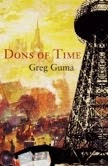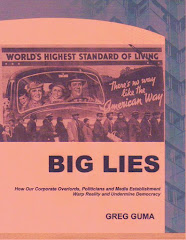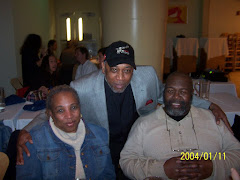We rode to Houston Media Source, the city’s public access center, on an ancient school bus chartered for the occasion. It was Sunday, October 30, 2005, and the Pacifica National Board was still considering who to choose as the network’s next CEO.
During the trip, I struck up a conversation with Ursula Ruedenberg, coordinator of Pacifica’s Affiliates Program. Ursula had been active in the “Save Pacifica” movement and afterward took on the tough job of convincing community radio stations that it was all right to rejoin the new and improved network. Curious about my Vermont connections, she fondly recalled her days with Bread and Puppet Theatre, based in the Green Mountains since the 1970s.
Seated nearby was Sarv Randhawa, a nuclear plant regulator who represented KPFA on the national Board. Sarv was intrigued by my relationship with peace movement icon Dave Dellinger, who had died the year before. We talked about nonviolence and Dave’s ability to overcome differences with love and mutual respect. Pacifica needed that kind of energy to live up to its potential, he believed.
While the Board met in the center’s large studio, Eva Georgia and I waited at opposite ends of the labyrinthine building. I’d caught a glimpse of her, but the headhunters were determined to keep us apart. Struggling to relax, I drew on my training in Buddhist mediation to drop my expectations and simply “be” in the moment. After a while a wiry man entered the waiting room and introduced himself as Steve Brown.
I knew the name from e-mails that were part of my research. A successful entrepreneur who reportedly made millions through direct marketing, he was – depending on whom you asked – either greatly misunderstood or completely malevolent, a defender of diversity or a racist demagogue, an untapped resource or as dangerous as Karl Rove. Whatever the truth, his ideas were certainly provocative.
That August, for example, he had proposed eliminating most of the national office, including the CFO and other staff, and turning most of its functions over to local business managers or committees. “If we dumped most of the national office tomorrow,” he wrote, “what would we give up – other than the need for us to feed it $6.3 million (he was off by a few million) a year? Getting that money back would make the budgetary woes of all our stations disappear in a flash.”
But Brown’s real fire was saved for the situation at WBAI, where he served on the local station board, and especially for its Program Director Bernard White and the Justice and Unity Coalition (JUC), a cadre-style group with a majority of local board seats and a hard-edged anti-racist agenda. As he saw it, White had “unethically used the station’s resources to consolidate his own power” and bore most of the responsibility for several years of lost listenership and economic decline. And the JUC had let him do it, he charged, using underhanded means to maintain its control and foist a narrow agenda on the station.
Of course, JUC and White had equally harsh words for Steve, who they described as a racially obsessed liar and purveyor of stereotypes, intent on purging Black programmers and taking WBAI back to the “good old days.” Aware of this I wondered whether it was safe even to be seen talking with him. But he just wanted to wish me good luck, offer a business card, and volunteer some advice if I got the job. Compared to his e-mails, the casually dressed 68-year-old seemed mild, almost stuffy.
Ushered into the dimly-lit studio at last, I struggled to remain calm. A serious examination of the organization’s mission was in order, I suggested; after almost 60 years it was about time. I also stressed that Pacifica – one of few independent voices for change in the time of fear and Bush doublespeak – had both a responsibility and an opportunity to challenge mainstream media’s myopia and distortions, but was letting internal battles and provincial thinking get in the way. To make a fundamental difference, it would have to offer the country what founder Lew Hill had imagined for KPFA – dialogue and debate, a celebration of honest differences, not a series of self-righteous monologues that preached more than they persuaded. That was the terrain of self-appointed electronic prophets, right-wing pundits and evangelists who capitalized on mass insecurity to market extreme views and create a distorted reality. Pacifica would have to do better, becoming again a relevant, popular and entertaining voice for political change and social transformation.
Dave Adelson posed the most pointed question. A KPFK delegate and neurophysiologist who had devoted years to Pacifica and been at the center of the “take back” fight, he remained unconvinced. “Well, you’ve essentially said you can drive a car,” he challenged, “but this place is more like a semi truck. How do we know you can drive something like that?”
Whatever their size or shape, organizations are pretty much the same, I suggested, and I’d led and studied them for more than 30 years. The same can be said of people. Whatever their political differences, they want to be heard, appreciated, and inspired. The leadership challenge would be to listen, resist taking sides in factional disputes, and, at the same time, clarify what makes this a unique organization.
Two more things are worth mentioning. WBAI board member Ray LaForest, a Haitian immigrant and union organizer, asked how long I was willing to remain in the job. Three years was my limit, I announced bluntly. If I could accomplish anything useful, it would happen by then or not at all. What I left out was my belief, based on past experiences, that leading a politically-charged organization for much longer can be dangerous.
Fear about the use of power, especially among progressive types, tends to breed suspicion over time and turn support into bitter opposition. In a country where narcissism is a widespread disorder, public figures are often idealized in the early stage. But along with that comes the urge to degrade in the long run, often sparked when the “hero” inevitably disappoints. Intensified by the machinery of mass communication, such a desperate urge can turn even assassination into a form of spectacle. Not that I was in danger of being murdered. But judging from Pacifica’s recent history, character assassination wasn’t out of the question if I overstayed my welcome.
The second point was that even if the job was offered, I wasn’t ready to accept. Before making a decision, I needed to talk personally with members of the staff and Board. What I found out might well influence my decision.
Before the ride back to Bush airport, I heard that the board had voted. But the outcome wouldn’t be made public. “Put me out of my misery,” I joked. All the headhunters would say was, “Hang in, the vote was close and they’re hoping to get closer to consensus. It’s not over yet.” That wasn’t completely accurate. As I learned later, Eva Georgia had narrowly prevailed, but the decision wouldn’t be binding until background checks were conducted.
Back in Vermont, I focused on work at Vermont Guardian, a print and online news venture launched less than two years before. For my partner Shay Totten, a brilliant reporter and editor who I’d known since the late 90s, it was the fulfillment of a dream – a statewide news organization that would reflect “the Vermont Way.”
Our mission statement noted that although Vermont had recently “led the way toward social and political progress” – a statement that could be read as a reference to environmental legislation, Town Meeting activism, gay civil unions, third party politics, Howard Dean’s presidential run, or Ben and Jerry’s Ice Cream, to name a few – its newspapers had largely been gobbled up by large corporations. Vermont Guardian would “reinvigorate the credo that journalism speaks for the individual, checks abuses of power, and stands vigilant in the protection of democracy and free speech,” we wrote. It would become the state’s “editorial town commons, a place where Vermonters can share ideas and forge solutions.”
Despite the bold words and good intentions, however, the business was struggling. It made me wonder: Like the national administration we often criticized, were our grand ambitions a form of folly? In a post-Thanksgiving editorial, I considered the consequences of ignoring harsh realities.
Those responsible for the Vietnam War, I recalled, insisted on "staying the course" due to a combination of overreaction, illusions of omnipotence, and a shortage of reflective thought. The ingredients that created the Iraq War were much the same – exaggerating "national security" imperatives, assuming that the world’s “only remaining Superpower” couldn’t possibly lose, and refusing to consider that an invasion could spark global resistance, potentially on a scale that would be impossible to contain.
Yet, describing the Iraq debacle as mere folly was too simple. One alternative was incompetence, since those eager to save face later claimed the war began due to a "massive intelligence failure,” pointing to years of so-called evidence that Saddam Hussein's regime posed a serious threat to Iraq's neighbors and the West. But even such semi-critics endorsed the idea that the US should pursue "regime change." In other words, they had grandly assumed the right to transform a country, to replace its power structure and "democratize" it.
Folly, incompetence, delusions of grandeur? It was hard to choose. In the case of the Bush administration it clearly wasn’t a mistake. It was a conscious decision that looked more like tyranny.
What’s the true history of the Iraq war? The evidence is still coming in. But we already know that the story begins long before Congress voted, and before the 9/11 attacks so often used to justify an open-ended "war on terror." Were lies told? Certainly. It stands to reason, since many of the war's architects were admirers of philosopher Leo Strauss, a great believer in the usefulness of lies.
Secrecy and deception, a veritable culture of lies, are necessary, Strauss argued, to protect "the wise" – those with a natural right to rule – from the vulgar masses, who would otherwise be ungovernable and rise up against them. He called such tactics “noble” lies. "Because mankind is intrinsically wicked, he has to be governed," Strauss wrote. "Such governance can only be established, however, when men are united – and they can only be united against other people."
And the lessons? Well, people often deceive themselves – overreact to perceived threats, exaggerate, or fail to distinguish between fears, hopes and reality. That is folly, and it’s both human and forgivable. But when deception is willful and rationalized as somehow justified or “noble,” perhaps because an enemy must be stopped “by any means,” the line between good and evil has been crossed.
Looking at Pacifica, I wondered whether its warring camps were letting fear cloud their judgment, or purposely distorting the picture to achieve bitter victories. More to the point, if offered the job, could I overcome such deep-seated animosities and alter its culture? Or was I just trading one form of folly for another? No easy answers leapt to mind.
Nevertheless, on December 21, these became more than academic questions. After almost two months and endless hours of teleconference debate, the board had reached a decision. It seemed impossible, but the “old white guy” was being offered the dream job from hell. The catch was that I had ten days to decide. Only later did I find out how this came to pass – and how frustrating a dream job can be.































No comments:
Post a Comment